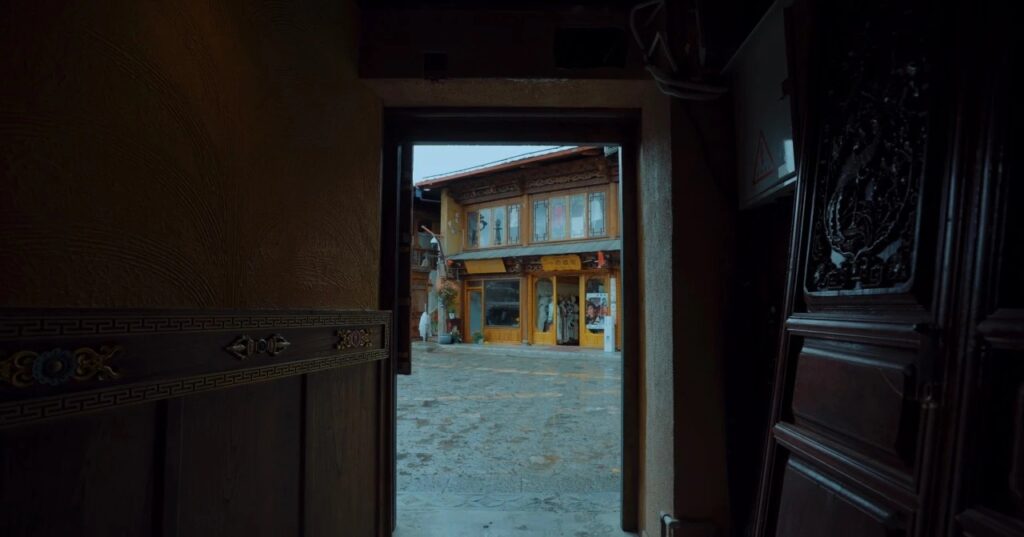 八月的香格里拉,大部队与不由分说的急促细雨一同抵达,夜被灌饱了墨汁,但走在这样的凝暗中不会觉得安全感缺失,更多的是一种平和。(至少在一行人冒雨拖着硕大行李箱,踏上潮湿又打滑的石板路之前是这样)
八月的香格里拉,大部队与不由分说的急促细雨一同抵达,夜被灌饱了墨汁,但走在这样的凝暗中不会觉得安全感缺失,更多的是一种平和。(至少在一行人冒雨拖着硕大行李箱,踏上潮湿又打滑的石板路之前是这样)关于这次拍摄的筹备工作已在北京展开两三个月,所以平均三千多米的海拔对于“久经沙场”的工作人员来说自当不算什么。在来时的机场,听从导演的提议,大家伙狠狠地吃了一顿麦当劳,他说开始骑行后可就没有这些了。导演回想起去年来云南骑行的经历,“就是开心快乐”,有一帮兄弟陪着嘻嘻哈哈~不过,能量自然是守恒的,当快乐的因子多了,属于自己独处和思考的容量就小了。
导演随笔:这不是一个开始,是中断了过后重新开始的故事,在八月中断,又在八月开始。去年的时候踌躇满志,带着一群兄弟到云南,今年又来了,我一个人。有些东西丢失在了八月的风里,想通过这次旅程找到什么。我从头走以前的路,是不是就能找回被丢失的东西。
不过做后期时,导演对于一个人出行的行为又有了新的想法,“也可能是因为当时刚经历了事情,自己还没有勇气踏上一个人的旅程,就像一个残破的躯体不确定能不能经受住风刀霜剑,我也需要朋友的陪伴和温暖。今年,自己更加强大和坚实了,觉得一个人应该可以。”(不过,这次还是带了一位新朋友-吉他手小C,出发之前他放下豪言“当然可以骑”,工作人员表示欣喜,终于有第二机位可以捕捉到导演身影了。结果在小C的GoPro里,我们看到的是导演长达5秒一溜烟飞驰而去的矫健身姿,和小C颤颤巍巍的车把+无穷尽的呼哧带喘😅)
在遇见邓珠老师前,对他的认知是由“男、30岁、快乐弦子吧、音乐”这几个关键词组成。现实中的他与想象中似乎并无二致,他是健谈的、外向的、积极乐观的、热爱音乐的。他的日常是制作弦子、草原上喝茶拉弦子、晚上在自己的酒吧拉弦子。音乐之于他来说不是个兴趣喜好,而是再正常不过的一种生活方式。他坐在草地说着“从小就爱唱歌”、“从来没有想过不拉弦子的生活”,也自然而然地谈到,自己下午还要去松茸市场采购松茸,给天南海北的朋友发出去。原来正值8月雨季,是香格里拉松茸长势正好的季节,“应该算是我的副业,我赚点跑腿费”、“一面是爱好、一面是生活”。他说起来坦诚又率性,没有所谓艺术与商业、月亮与便士不能共存的“精神洁癖”,反倒让人觉得爽快坦荡。
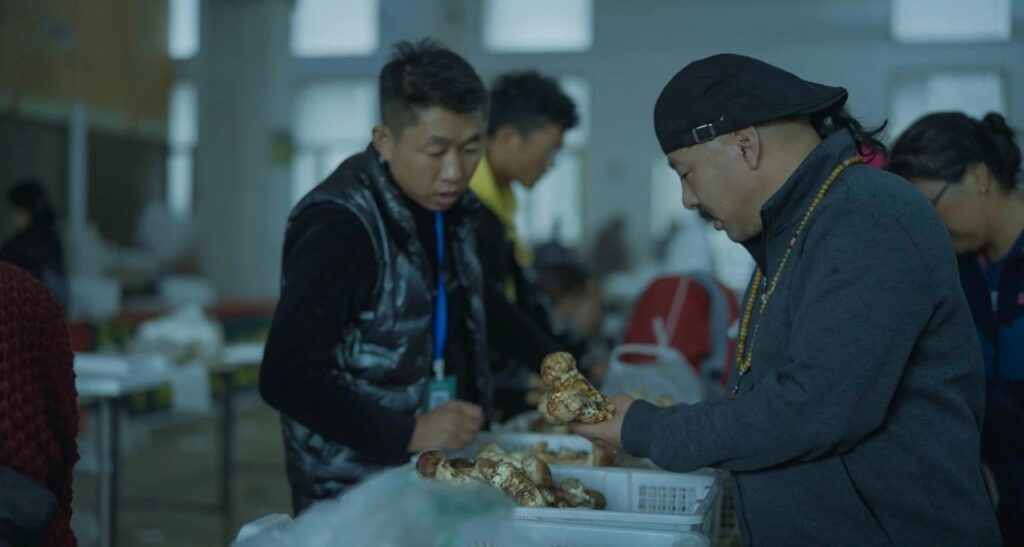
这都是意料之外的收获和惊喜,就像他在每次表演前说的那句“世界和平”,如同一粒石子击中每个人的心间,荡起一圈一圈涟漪,伴着传统民族乐器的悠扬歌声熨烫日常生活中的褶皱。
导演随笔:弦通过振动产生音律,声带通过气流冲击引起振动发声,用手敲鼓面的时候,根据不同位置和不同力度会产生不同的音调。大家把情感通过音乐展现,乐器虽然不会说话,但它是位聆听者,也许没有完全懂你的朋友/爱人,但只有乐器忠于你自己,乐器可以映射出你自己。我们也要做聆听者。聆听别人、聆听自然,这样才不孤独。
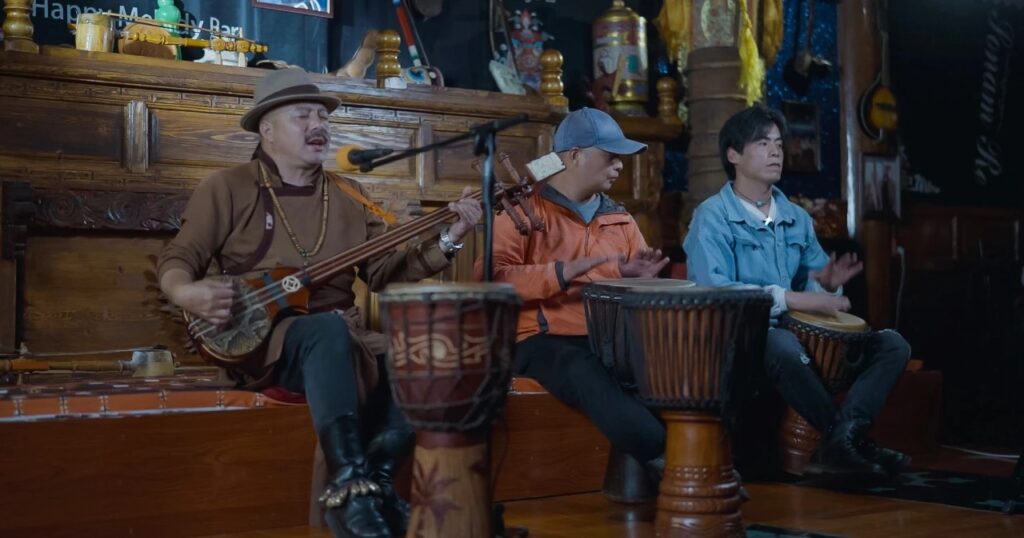
·聊演出:
邓珠:“每天晚上都演,没有客人,我自己自娱自乐”
·聊保持快乐的秘籍:
邓珠:“知足”
·聊城市:
邓珠:“第一是离家太远了,第二是我觉得人的一生不必要有那么多的苦。每个人都有一颗善良的心,但很多都是生活逼出来的,所以就没办法。”
·聊欲望:
邓珠:“可能你们的欲望更大,以后要拍多少电视剧电影……那么多观众”
导演:“没有,这个片子恰恰不是以赚钱和盈利为目的做的,我是希望从自身的一些经历出发,以骑行方式,通过遇见像邓珠老师这样的人,希望看到这部片子的人能够被治愈。希望大家看到您的时候,会被您乐观的态度感染,他们通过影片得到心灵的安慰。或许每个人都会经历挫折和痛苦,靠逃避是不会让它消失的,人生的路还有很长。”
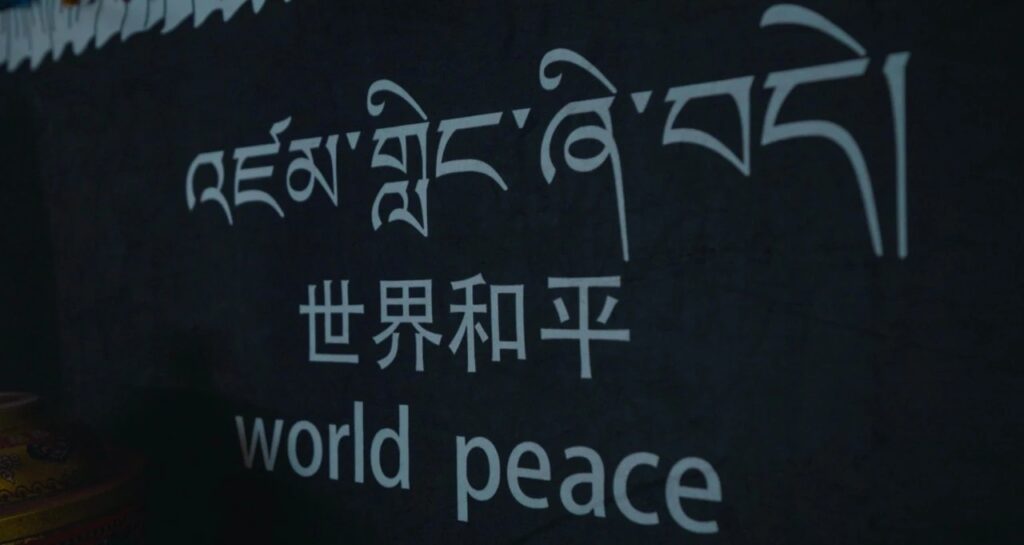
快要离开香格里拉了。时至今日,人们依旧用心中最美好的词汇去赋予这个地方,这里是长在心上的皎洁日月、是神圣遥远的地平线、是避秦的桃源仙境。这里分明是距离战乱最远的地方,是空灵的安居让人们生长出“世界和平”的祈愿,还是人人有如此美好的愿景从而构建出这么一片安宁。我不知道了,这里像被时光赦免的角落,清香不减,也不在人知。
弦子是邓珠老师经年抚过的一种乐器,也是流淌在日夜吟唱的当地人血脉中的音乐。第一站是与音乐的相逢,音乐也会陪伴大家走过接下来的路。导演说,我十年前骑行川藏时,耳机里只有一首歌,一直听、一路听。
附赠弦子吧live(看小抄)版《未完成的旅行》

Director’s Notes, Meeting Xuanzi
 In August, Shangri-La welcomed the main group amidst an urgent drizzle, saturating the night with soaked ink. Yet, walking in such solemn darkness didn’t feel devoid of safety; instead, it exuded tranquility. (At least until the moment a group of people, dragging hefty suitcases, stepped onto the damp and slippery cobblestone path in the rain.)
In August, Shangri-La welcomed the main group amidst an urgent drizzle, saturating the night with soaked ink. Yet, walking in such solemn darkness didn’t feel devoid of safety; instead, it exuded tranquility. (At least until the moment a group of people, dragging hefty suitcases, stepped onto the damp and slippery cobblestone path in the rain.)Preparations for this film shoot had been underway in Beijing for two to three months, so the altitude of over 3,000 meters was nothing for the seasoned crew. At the airport, following the director’s suggestion, everyone indulged in a hearty McDonald’s meal, knowing they wouldn’t have such luxuries once they started the cycling trip. The director recalled last year’s cycling trip to Yunnan as “pure joy,” with a group of brothers accompanying him cheerfully. However, based on the principle of energy conservation, he also reflected on how an abundance of happiness could diminish one’s capacity for solitude and reflection.
Director’s Note: This isn’t a new beginning; it’s the continuation of a story interrupted in August, only to resume again in August. Last year, full of ambition, I went to Yunnan with a group of brothers. This year, I returned alone, seeking something lost in the winds of August. Can retracing my steps lead me back to what was lost?
But during post-production, the director had new thoughts about solo travel. “Perhaps it was because I had just gone through something; I wasn’t brave enough to embark on a solo journey. Like a broken body uncertain if it could withstand the harsh wind and bitter frost, I needed the companionship and warmth of friends. This year, I feel stronger and more solid, believing I can go alone.” (However, this time, a new friend—a guitarist named Xiao C—joined him. Before departure, Xiao C confidently declared, “Of course, I can ride.” The crew rejoiced, finally having a second angle to capture the director’s figure. Yet, in Xiao C’s GoPro footage, all they saw was the director speeding away for a solid five seconds, while Xiao C struggled with the handlebars and endless labored panting.)
Before meeting Teacher Deng Zhu, the director’s perception of him was defined by keywords like “male, 30 years old, cheerful string musician, music.” In reality, he was just as imagined: talkative, outgoing, optimistic, and passionate about music. His daily routine involved making Xuanzi( a Tibet traditional music instrument), drinking tea and playing Xuanzi on the grassland, and performing at his own string bar at night. Music wasn’t just a hobby for him; it was a way of life. Sitting on the grass, he would say things like, “I’ve loved singing since I was little,” and “I’ve never thought about a life without playing Xuanzi.” He casually mentioned going to the mushroom market in the afternoon to buy mushrooms for friends far and wide. It was the rainy season in August, the perfect time for matsutake mushrooms in Shangri-La. “It’s kind of a side job for me, earning some extra cash,” he said. “It’s a hobby and a breadwinner.” He spoke candidly and naturally, devoid of any “spiritual purity” that forbade the coexistence of art and commerce, moonlight and six pennies, very refreshed and straightforward.

These unexpected discoveries were like treasures, just as his pre-performance routine declaration of “world peace” resonated in everyone’s hearts, sending ripples across their lives, iron out the wrinkles of life with the melodious sounds of traditional ethnic instruments.
Director’s Note: Xuanzi produce melodies through vibration, vocal cords create sound through airflow, and tapping different parts of a drum, with different force produces different tones. We express emotions through music. Although instruments can’t speak, they listen. Perhaps not everyone, not even loved ones, fully understands you, but your instruments remain faithful. They reflect who you are. We need to be listeners, to others and to nature, to avoid loneliness.

Talking about performances:
Deng Zhu: “I perform every night, even if there is no audience, I entertain myself.”
Talking about staying happy:
Deng Zhu: “Being content.”
Talking about big city:
Deng Zhu: “First, it’s too far away from home. Second, I think life shouldn’t be filled with so much suffering. Everyone has a kind heart, but many are forced by life, so there’s no way.”
Talking about desires:
Deng Zhu: “Maybe your desires are bigger. You’ll need to make more TV shows and movies… with so many audiences waiting.”
Director: “No, this film wasn’t made with the goal of making money. I hope to heal people through my own experiences, through cycling, and by meeting people like you. I hope those who watch this film can be healed. When people see you, I hope they’ll be infected by your optimistic attitude and find solace in the film. Perhaps everyone will experience setbacks and pain, but avoiding them won’t make them disappear. Life’s journey is still long.”

We’re about to leave Shangri-La. To this day, people still use the most beautiful words in their hearts to describe this place: it’s the bright moon and the distant horizon, the sacred and remote haven, the paradise away from Qin’s tyranny. It’s the farthest place from war, where the ethereal habitat fosters wishes for “world peace,” and everyone envisions such beauty, thus creating peace. I don’t know; this place seems like a corner pardoned by time, where the fragrance remains undiminished, yet unnoticed by people.
The string instrument, touched by Teacher Deng Zhu for years, is both an instrument and the music flowing in the blood of the local people’s song day and night. The first stop is the encounter with music, which will accompany everyone on the journey ahead. The director said, “Ten years ago, when I cycled through the Tibetan Plateau, there was only one song playing in my headphones, all the way.”
Bonus: Live version of “Unfinished Journey” by the String Bar (see the notes).



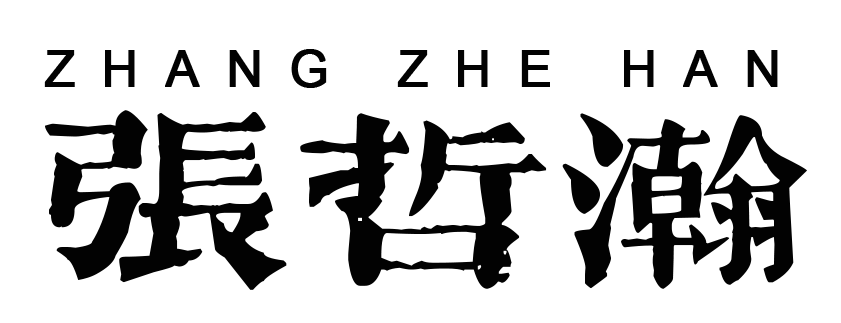
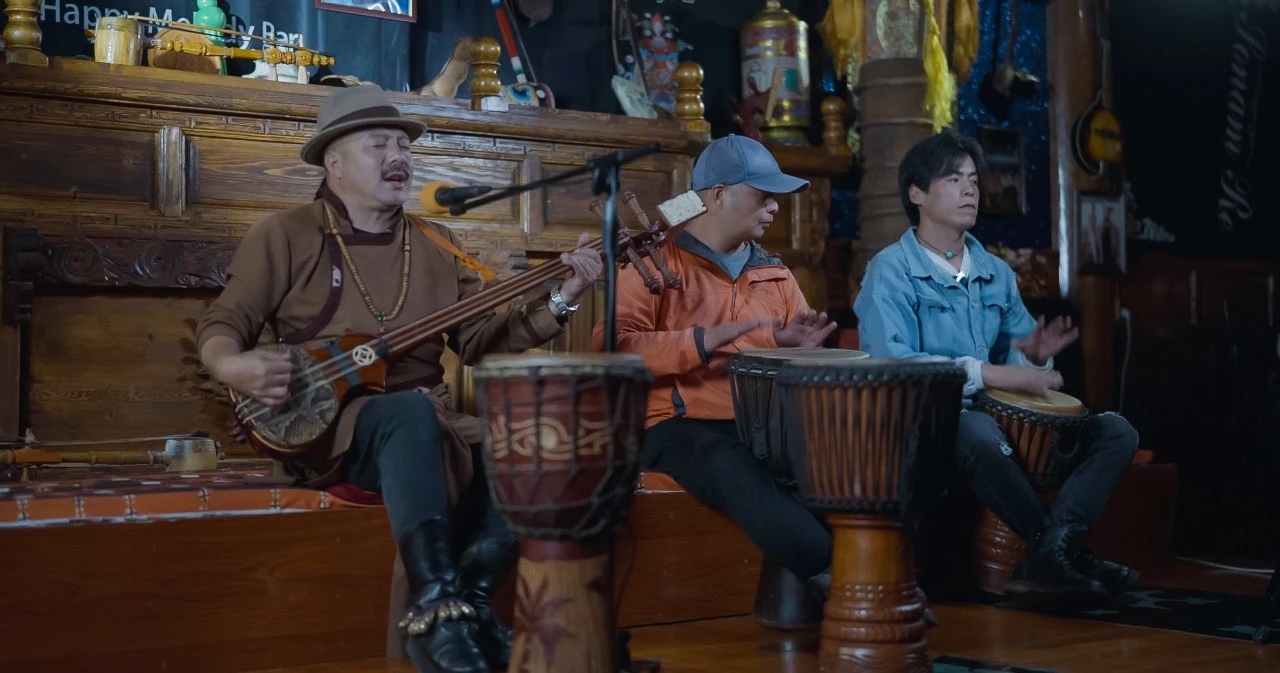


船長唱的真好聽🫶
翻译 Translate
簡單的音樂和拍打鼓聲,未完成的旅行好清新。
翻译 Translate
未完成的旅行好聽🎤
翻译 Translate
就像船長校園裡清唱的那首英文歌,加上同學的合音,是這麽動聽👏👏👏
翻译 Translate
最簡單的樂器,最自然的聲音
翻译 Translate
希望我的心能变结实,但受伤的地方却无法恢复。时间久了,伤口会好吗?
翻译 Translate
我可能才是地球上的陌生人。
翻译 Translate
希望坏东西不要靠近我。 我只想看着好东西漂亮的东西生活。
翻译 Translate
去音乐会看船长也是人生的一大欢乐。
翻译 Translate
对船长的信任和心是支撑我的力量。
翻译 Translate
我还能用船长的歌声坚持到底。
翻译 Translate
尽管很累,但总有一些事情要做。
翻译 Translate
8月拍纪录片的时候,船长不累吗?
翻译 Translate
但还是努力做吧。 在告诉自己。
翻译 Translate
我现在上班,身体不舒服。 太疲倦了。
翻译 Translate
🎂恭賀《八月》自然與音樂的融合….悅耳🎵
翻译 Translate
哇!我們船長坐小飛碟出來巡視了😄
翻译 Translate
與大自然容合一體的音樂,悅耳
翻译 Translate
弦子的玄是用馬的尾巴作的,好特別
翻译 Translate
老師的弦子拉得真好聽
翻译 Translate